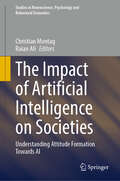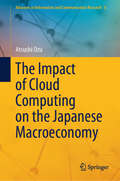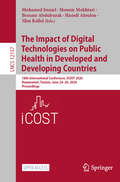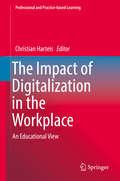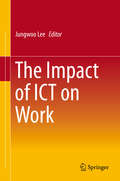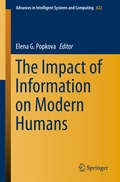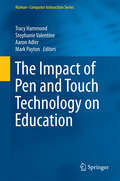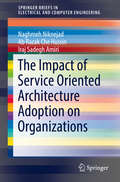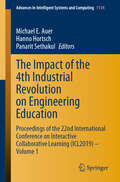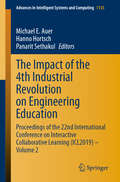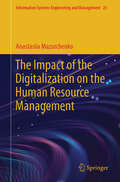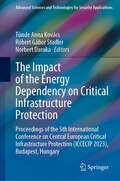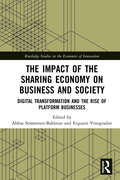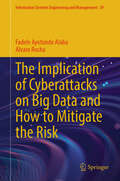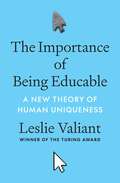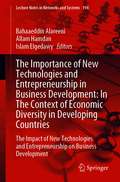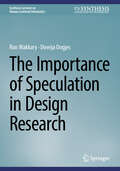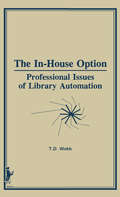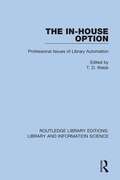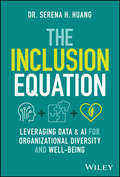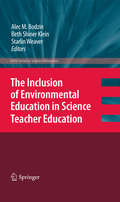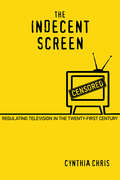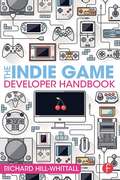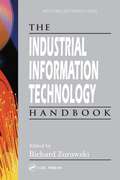- Table View
- List View
The Impact of Artificial Intelligence on Societies: Understanding Attitude Formation Towards AI (Studies in Neuroscience, Psychology and Behavioral Economics)
by Christian Montag Raian AliThis book presents a recent framework proposed to understand how attitudes towards artificial intelligence are formed. It describes how the interplay between different variables, such as the modality of AI interaction, the user personality and culture, the type of AI applications (e.g. in the realm of education, medicine, transportation, among others), and the transparency and explainability of AI systems contributes to understand how user's acceptance or a negative attitude towards AI develops. Gathering chapters from leading researchers with different backgrounds, this book offers a timely snapshot on factors that will be influencing the impact of artificial intelligence on societies. Chapter 12 is available open access under a Creative Commons Attribution 4.0 International License via link.springer.com.
The Impact of Cloud Computing on the Japanese Macroeconomy (Advances in Information and Communication Research #6)
by Atsushi OzuThis book focuses on the economic aspects of cloud computing, a critical ICT infrastructure in our digital age. The market for cloud computing is rapidly expanding and changing the nature of business in all industries. This book estimates and analyzes the impact of the diffusion of cloud computing on the Japanese macroeconomy, employing model-based simulations. Cloud computing services are being provided not only as simple data storage services but also as various value-added services. The market has shifted to an oligopoly, with a limited number of big-name global firms as the main players. This book quantitatively estimates the impact of this shift on Japan’s utility-based social welfare. The book also discusses public policy measures that can enhance free competition in a cloud computing market with oligopolistic characteristics. One aim of this book is to provide policymakers and researchers with fundamental data and an analytic approach that can be used to formulate public policy around cloud computing in terms of both regulation and market promotion.
The Impact of Digital Technologies on Public Health in Developed and Developing Countries: 18th International Conference, ICOST 2020, Hammamet, Tunisia, June 24–26, 2020, Proceedings (Lecture Notes in Computer Science #12157)
by Mounir Mokhtari Hamdi Aloulou Bessam Abdulrazak Slim Kallel Mohamed JmaielThis open access book constitutes the refereed proceedings of the 18th International Conference on String Processing and Information Retrieval, ICOST 2020, held in Hammamet, Tunisia, in June 2020.* The 17 full papers and 23 short papers presented in this volume were carefully reviewed and selected from 49 submissions. They cover topics such as: IoT and AI solutions for e-health; biomedical and health informatics; behavior and activity monitoring; behavior and activity monitoring; and wellbeing technology.*This conference was held virtually due to the COVID-19 pandemic.
The Impact of Digitalization in the Workplace: An Educational View (Professional and Practice-based Learning #21)
by Christian HarteisThis edited volume brings together researchers from various disciplines (i.e. education, psychology, sociology, economy, information technology, engineering) discussing elementary changes at workplaces occurring through digitalization, and reflecting on educational challenges for individuals, organizations, and society. The latest developments in information and communication technology seem to open new potential, and the crucial question arises which kind of work can be replaced by technology? The contributors to this volume are scholars who have been conducting research on the influence of technological change on work and individuals for a long time. The book addresses researchers as well as practitioners in the field of adult education and human resource development.
The Impact of ICT on Work
by Jungwoo LeeThis edited volume presents current perspectives on the innovative use of Information and Communication Technologies (ICT) as an integral part of the changing nature of work. The individual chapters address a number of key concepts such as telecommuting, alternative work arrangements, job crafting, gamification and new work skills, supplemented by a range of examples and supporting case studies. The Impact of ICT on Work offers a valuable resource for business practitioners and academics in the areas of information systems, as well as for human resources managers. The book will also be useful in advanced graduate classes dealing with the social and business impacts of information and communication technologies.
The Impact of Information on Modern Humans (Advances In Intelligent Systems And Computing #622)
by Elena G. PopkovaThis book features contributions from various spheres of socio-humanitarian sciences presented at the scientific and practical conference on “Humans as an Object of Study by Modern Science,” which took place in Nizhny Novgorod (Russian Federation) on November 23–24, 2017. The conference was organized by Kozma Minin Nizhny Novgorod State Pedagogical University and the non-profit organization “Institute of Scientific Communications.” Presenting the results of multidisciplinary studies as well as new approaches, the target audience of the book includes postgraduates, lecturers at higher educational establishments, and researchers studying socio-humanitarian sciences. The complex study of humans by representatives of various socio-humanitarian sciences (philosophy, pedagogics, jurisprudence, social sciences, and economics) allows a comprehensive concept of the field to be developed. Selecting humans as an object of research opens wide possibilities for studying various issues related to their activities, while considering humans within multiple sciences means that the methods of induction and deduction can be combined to achieve precise results. This book includes the results of leading scientific studies on the following key issues: establishment of an information economy under the influence of scientific and technical progress: new challenges and opportunities; information and communication technologies as a new vector of development of the modern world economy; specifics and experience of using new information and communication technologies in developed and developing countries; problems of implementing new information and communication technologies in the modern economy; and priorities of using new information and communication technologies in the modern economy.
The Impact of Pen and Touch Technology on Education
by Aaron Adler Tracy Hammond Stephanie Valentine Mark PaytonThis book presents perspectives for and by teachers, school and university administrators and educational researchers regarding the great impact pen and tablet technology can have on classrooms and education. presents three distinctly valuable threads of research: Emerging technologies and cutting-edge software invented by researchers and evaluated through real classroom deployments. First-hand perspectives of instructors and administrators who actively implement pen or tablet technologies in their classrooms. Up-and-coming systems that provide insight into the future of pen, touch, and sketch recognition technologies in the classrooms and the curriculums of tomorrow. The Impact of Pen and Touch Technology on Education is an essential read for educators who wish get to grips with ink-based computing and bring their teaching methods into the twenty-first century, as well as for researchers in the areas of education, human-computer interaction and intelligent systems for pedagogical advancement.
The Impact of Service Oriented Architecture Adoption on Organizations (SpringerBriefs in Electrical and Computer Engineering)
by Iraj Sadegh Amiri Naghmeh Niknejad Ab Razak HussinThis book describes Service-Oriented Architecture (SOA) and the significant factors which affect its adoption, such as governance, strategy, complexity, Return on Investment (ROI), business and IT alignment, culture and communication, costs, and security. The study on which this book is based, involved a quantitative analysis to investigate the influential factors for adopting SOA, paving the way to further research in the field.
The Impact of the 4th Industrial Revolution on Engineering Education: Proceedings of the 22nd International Conference on Interactive Collaborative Learning (ICL2019) – Volume 1 (Advances in Intelligent Systems and Computing #1134)
by Michael E. Auer Hanno Hortsch Panarit SethakulThis book gathers papers presented at the 22nd International Conference on Interactive Collaborative Learning (ICL2019), which was held in Bangkok, Thailand, from 25 to 27 September 2019. Covering various fields of interactive and collaborative learning, new learning models and applications, research in engineering pedagogy and project-based learning, the contributions focus on innovative ways in which higher education can respond to the real-world challenges related to the current transformation in the development of education. Since it was established, in 1998, the ICL conference has been devoted to new approaches in learning with a focus on collaborative learning. Today, it is a forum for sharing trends and research findings as well as presenting practical experiences in learning and engineering pedagogy. The book appeals to policymakers, academics, educators, researchers in pedagogy and learning theory, school teachers, and other professionals in the learning industry, and further and continuing education.
The Impact of the 4th Industrial Revolution on Engineering Education: Proceedings of the 22nd International Conference on Interactive Collaborative Learning (ICL2019) – Volume 2 (Advances in Intelligent Systems and Computing #1135)
by Michael E. Auer Hanno Hortsch Panarit SethakulThis book gathers papers presented at the 22nd International Conference on Interactive Collaborative Learning (ICL2019), which was held in Bangkok, Thailand, from 25 to 27 September 2019. Covering various fields of e-learning and distance learning, course and curriculum development, knowledge management and learning, real-world learning experiences, evaluation and outcomes assessment, computer-aided language learning, vocational education development and technical teacher training, the contributions focus on innovative ways in which higher education can respond to the real-world challenges related to the current transformation in the development of education. Since it was established, in 1998, the ICL conference has been devoted to new approaches in learning with a focus on collaborative learning. Today, it is a forum for sharing trends and research findings as well as presenting practical experiences in learning and engineering pedagogy. The book appeals to policymakers, academics, educators, researchers in pedagogy and learning theory, school teachers, and other professionals in the learning industry, and further and continuing education.
The Impact of the Digitalization on the Human Resource Management (Information Systems Engineering and Management #25)
by Anastasiia MazurchenkoThis book is strongly recommended for L&D professionals, HR managers, senior managers, and company owners who want to adapt their employees' training and skills development to the changing requirements of digitalization and technological progress, considering the specifics of the sector in which their organizations operate. It is unique in that it compares the views of employers and employees on digitalization and the development of digital competencies and skills and highlights the need to align them as part of implementing a long-term HR development strategy in an organization. The book features statistical hypothesis testing and links to the case studies, and it covers such areas as the historical development of digitalization, advantages, and disadvantages of technologies in HR management, the role of competency models, and organizational training in conditions of the Fourth and Fifths Industrial revolutions. The book also explores how employees' digital skill levels depend on age and career longevity and how much the level of digital readiness of organizations is affected by labor market trends and the impact of the COVID-19 pandemic. Taking into account practical recommendations and issues to consider, it emphasizes the need to update competency models, support a culture of continuous organizational training and knowledge sharing, and extend an organization's digital infrastructure to retain competitive human resources in the dynamic digital age. Readers will receive a comprehensive understanding of digitalization in human resource management and how it influences competency requirements for employees in different sectors in the international context.
The Impact of the Energy Dependency on Critical Infrastructure Protection: Proceedings of the 5th International Conference on Central European Critical Infrastructure Protection (ICCECIP 2023), Budapest, Hungary (Advanced Sciences and Technologies for Security Applications)
by Tünde Anna Kovács Norbert Daruka Róbert Gábor StadlerThis book presents cutting-edge research on the impact of energy dependence and strategies to mitigate it. As a crucial component of critical infrastructure, energy security is a top priority for nations worldwide. The protection of this infrastructure, along with the latest research tools and methodologies, is of significant interest to both policymakers and industry leaders. The book delves into two primary areas of research: cybersecurity and physical security, summarizing the latest findings in these critical fields. The papers in this volume offer valuable insights for both academic and industrial audiences, addressing the pressing challenges of energy security. Energy is integral to every aspect of our daily lives. Our comfort, as well as our safety, hinges on the uninterrupted supply of energy. Recent global events, particularly the Russian-Ukrainian war, have underscored the vulnerability of nations lacking sufficient energy resources. Europe's energy supply has been severely disrupted by sanctions, highlighting the need for energy resilience. However, this crisis has also accelerated the adoption of renewable energy sources, marking a pivotal shift towards sustainable energy solutions.
The Impact of the Sharing Economy on Business and Society: Digital Transformation and the Rise of Platform Businesses (Routledge Studies in the Economics of Innovation)
by Abbas Strømmen-Bakhtiar Evgueni VinogradovThe emergence of new platform business models, notably the sharing economy, is impacting the economy in various ways, altering the structure of many industries, and raising a number of economic and political issues. This book investigates the widespread influence of the sharing economy on businesses and society, as well as examining its underpinning economic principles and development. This volume presents an exhaustive review of the existing knowledge on the sharing economy and addresses several major areas of concern for incumbent businesses. It also explains the business models for those who are interested in embarking on their own ventures and provides an excellent source for further research. It takes an in-depth look at controversial labour policies, such as using labour as self-employed contractors or using regulatory grey areas to expand in markets. It is highly multidisciplinary, establishing links between economics, finance, marketing and consumer behaviour. This contribution on the sharing economy will enable researchers and graduate and doctoral students to expand and improve their understanding of this topic and identify new research problems in all of these areas. The book will also appeal to policy makers, regional and local government decision makers, and those interested in labour markets transformation.
The Implication of Cyberattacks on Big Data and How to Mitigate the Risk (Information Systems Engineering and Management #39)
by Alvaro Rocha Fadele Ayotunde AlabaThis comprehensive book explores the challenges posed by cyberattacks on big data systems and their corresponding mitigation strategies. The book is organized into logical chapters, each focusing on specific aspects of the subject, ensuring clarity and depth in addressing the multifaceted nature of the problem. The introductory chapter provides a clear overview of the problem, introducing the prevalence of cyberattacks on big data systems, the motivation for addressing these risks, and the goals of the book. It also outlines the goals of the book, such as identifying vulnerabilities, evaluating mitigation strategies, and proposing integrated solutions. The second chapter provides a detailed examination of cyberattacks, emphasizing their implications for big data systems. It systematically categorizes tools and techniques available for mitigating these risks, including identity and access management (IAM), symmetric data encryption, network firewalls, IDPS, data loss prevention (DLP), SIEM, DDoS protection, and big data backup and recovery strategies. The book focuses on key mitigation techniques, such as IAM, encryption methods, network segmentation, firewalls, and intrusion detection systems. It also proposes an integrated cybersecurity model, combining these solutions for enhanced effectiveness against cyberattacks. The book also identifies research gaps and suggests areas for future research, such as adapting to emerging technologies and improving scalability in big data security frameworks. The book is a valuable resource for cybersecurity professionals, researchers, and practitioners aiming to address the unique challenges posed by cyberattacks on big data systems. The book aims to equip various professionals with the knowledge and strategies necessary to address the vulnerabilities associated with cyberattacks on big data environments.
The Importance of Being Educable: A New Theory of Human Uniqueness
by Leslie ValiantIn the age of AI, why our future depends on better understanding what makes us humanWe are at a crossroads in history. If we hope to share our planet successfully with one another and the AI systems we are creating, we must reflect on who we are, how we got here, and where we are heading. The Importance of Being Educable puts forward a provocative new exploration of the extraordinary facility of humans to absorb and apply knowledge. The remarkable &“educability&” of the human brain can be understood as an information processing ability. It sets our species apart, enables the civilization we have, and gives us the power and potential to set our planet on a steady course. Yet it comes hand in hand with an insidious weakness. While we can readily absorb entire systems of thought about worlds of experience beyond our own, we struggle to judge correctly what information we should trust.In this visionary book, Leslie Valiant argues that understanding the nature of our own educability is crucial to safeguarding our future. After breaking down how we process information to learn and apply knowledge, and drawing comparisons with other animals and AI systems, he explains why education should be humankind&’s central preoccupation.Will the unique capability that has been so foundational to our achievements and civilization continue to drive our progress, or will we fall victim to our vulnerabilities? If we want to play to our species&’ great strength and protect our collective future, we must better understand and prioritize the vital importance of being educable. This book provides a road map.
The Importance of New Technologies and Entrepreneurship in Business Development: The Impact of New Technologies and Entrepreneurship on Business Development (Lecture Notes in Networks and Systems #194)
by Islam Elgedawy Allam Hamdan Bahaaeddin AlareeniThis book introduces the students, researchers and practitioners into the subject and enabling technologies and applications pertaining to of technology, entrepreneurship and business development through research articles, case studies etc. It is primarily intended for academic purposes for learners of computer Science, management, accounting and information systems disciplines, economics,- entrepreneurship. Publishing chapters in the book is new innovative idea to spread the book in the Middle East and Arab countries and make the book achieve more sales. As many students in all levels, graduates and undergraduates in addition to research, professionals are not able to get sufficient resources because of the language concern.
The Importance of Speculation in Design Research (Synthesis Lectures on Human-Centered Informatics)
by Ron Wakkary Doenja OogjesThis book explores speculation in design research in the field of human-computer interaction (HCI). The authors reveal how speculative reasoning in design research increases the capacity of HCI to address a wider array of social and research challenges. Speculation in design research employs (1) leaps of imagination, (2) diverse ways of knowing or epistemologies, (3) ethical reflexivity, (4) and makes alternate possibilities experiential. This book shows how each can be productively and critically applied together through existing, emerging, and new research approaches in HCI. The aim of this book is to generously see speculation as more than a form of critique or genre of design research, to instead be seen as broadly central to the material investigations that govern much of the field. In doing so, the book aims to expand the potential role of speculation in HCI and shows how speculation is applicable to a wide range of research goals, which, in turn, creates research approaches in new directions. In expanding the approach and methodology of speculation in HCI, the books draw inspiration from other disciplines and intersectional perspectives. By examining current, emerging, and possible new forms of speculation methods, this book will be of interest to undergraduate and graduate students in HCI as well as seasoned researchers and practitioners.
The In-House Option: Professional Issues of Library Automation (Routledge Library Editions: Library And Information Science Ser. #47)
by Terry D WebbHere is a timely book that expertly addresses the current impact of automation on the profession of librarianship in terms of its practitioners, standards, and underlying philosophy. In clear and understandable language, author T. D. Webb focuses his discussion--with practical examples--on the important decision of the location of the computer--at the library site or a remote automation center. Designed to be a practical guide to host computer location, this articulate book also addresses the broad professional issues of library automation.
The In-House Option: Professional Issues of Library Automation (Routledge Library Editions: Library and Information Science #47)
by T. D. WebbThis book, first published in 1987, expertly addresses the impact of automation on the profession of librarianship in terms of its practitioners, standards, and underlying philosophy. In clear and understandable language, it focuses - with practical examples - on the important decision of the location of the computer - at the library site or a remote automation centre. Designed to be a practical guide to host computer location, this articulate book also addresses the broad professional issues of library automation.
The Inclusion Equation: Leveraging Data & AI For Organizational Diversity and Well-being
by Serena H. HuangAccessible, thorough guide to merging data analysis and AI with new talent strategies The Inclusion Equation is a comprehensive, one-of-a-kind guide to merging DEI and employee wellbeing concepts with data analytics and AI. In this book, renowned thought leader and professional keynote speaker Dr. Serena Huang explains exactly how to quantify the effectiveness of new talent strategies by connecting them to a firm ROI estimate, enabling readers to approach and win the favor of higher-ups in any organization with the same effectiveness that marketing and financial departments do. This book is written in a style that is appealing and accessible to all readers regardless of technical background, but with enough depth to provide real insight and strategies. Dr. Serena H. Huang distills her 10 years of Fortune 500 people analytics leadership experience into tools and framework you can leverage to measure and improve DEI and wellbeing in your workplace. Some of the topics explored in this book include: Attract and retain top talent, including Gen Z and Millennials, with tailored DEI and wellbeing strategies Quantifying not only a talent strategy's perceived initial effect on an organization, but also its improvement and expansion over time Turning DEI and wellbeing from illusive corporate concepts to quantifiable metrics Harness the power of AI to create synchronized DEI and wellbeing strategies that maximize ROI Getting serious attention from your CEO and CFO by quantifying HR initiatives Using data storytelling to demonstrate the business impact of DEI and wellbeing Preparing for the future by understanding the role of AI in creating an inclusive and healthy workplace The Inclusion Equation is a complete guide for DEI and wellbeing, covering getting started in measurement to using storytelling to influence leadership. This is the contemporary playbook for any organization intending to substantially improve their diversity, equity, inclusion, and employee wellbeing by leveraging data & AI. This book is also perfect for any data analytics professionals who want to understand how to apply analytics to issues that keep their CEOs up at night. Whether you are a data expert or data novice, as long as you are serious about improving DEI and wellbeing, this book is for you.
The Inclusion of Environmental Education in Science Teacher Education
by Starlin Weaver Beth Shiner Klein Alec BodzinIn the coming decades, the general public will be required ever more often to understand complex environmental issues, evaluate proposed environmental plans, and understand how individual decisions affect the environment at local to global scales. Thus it is of fundamental importance to ensure that higher quality education about these ecological issues raises the environmental literacy of the general public. In order to achieve this, teachers need to be trained as well as classroom practice enhanced. This volume focuses on the integration of environmental education into science teacher education. The book begins by providing readers with foundational knowledge of environmental education as it applies to the discipline of science education. It relates the historical and philosophical underpinnings of EE, as well as current trends in the subject that relate to science teacher education. Later chapters examine the pedagogical practices of environmental education in the context of science teacher education. Case studies of environmental education teaching and learning strategies in science teacher education, and instructional practices in K-12 science classrooms, are included. This book shares knowledge and ideas about environmental education pedagogy and serves as a reliable guide for both science teacher educators and K-12 science educators who wish to insert environmental education into science teacher education. Coverage includes everything from the methods employed in summer camps to the use of podcasting as a pedagogical aid. Studies have shown that schools that do manage to incorporate EE into their teaching programs demonstrate significant growth in student achievement as well as improved student behavior. This text argues that the multidisciplinary nature of environmental education itself requires problem-solving, critical thinking and literacy skills that benefit students' work right across the curriculum.
The Indecent Screen: Regulating Television in the Twenty-First Century
by Cynthia ChrisThe Indecent Screen explores clashes over indecency in broadcast television among U.S.-based media advocates, television professionals, the Federal Communications Commission, and TV audiences. Cynthia Chris focuses on the decency debates during an approximately twenty-year period since the Telecommunications Act of 1996, which in many ways restructured the media environment. Simultaneously, ever increasing channel capacity, new forms of distribution, and time-shifting (in the form of streaming and on-demand viewing options) radically changed how, when, and what we watch. But instead of these innovations quelling concerns that TV networks were too often transmitting indecent material that was accessible to children, complaints about indecency skyrocketed soon after the turn of the century. Chris demonstrates that these clashes are significant battles over the role of family, the role of government, and the value of free speech in our lives, arguing that an uncensored media is so imperative to the public good that we can, and must, endure the occasional indecent screen.
The Indian Periodical Press and the Production of Nationalist Rhetoric
by Sukeshi KamraConsiders the Indian periodical press as a key forum for the production of nationalist rhetoric. It argues that between the 1870s and 1910, the press was the place in which the notion of 'the public' circulated and where an expansive middle class, and even larger reading audience, was persuaded into believing it had force.
The Indie Game Developer Handbook
by Richard Hill-WhittallThe indie game developer’s complete guide to running a studio. <P><P>The climate for the games industry has never been hotter, and this is only set to continue as the marketplace for tablets, consoles and phones grow. Seemingly every day there is a story of how a successful app or game has earned thousands of downloads and revenue. As the market size increases, so does the number of people developing and looking to develop their own app or game to publish. The Indie Game Developer Handbook covers every aspect of running a game development studio—from the initial creation of the game through to completion, release and beyond. <P><P> Accessible and complete guide to many aspects of running a game development studio from funding and development through QA, publishing, marketing, and more. <P><P> Provides a useful knowledge base and help to support the learning process of running an indie development studio in an honest, approachable and easy to understand way. <P><P> Case studies, interviews from other studies and industry professionals grant an first-hand look into the world of indie game development
The Industrial Information Technology Handbook (Industrial Electronics)
by Richard ZurawskiThe Industrial Information Technology Handbook focuses on existing and emerging industrial applications of IT, and on evolving trends that are driven by the needs of companies and by industry-led consortia and organizations. Emphasizing fast growing areas that have major impacts on industrial automation and enterprise integration, the Handbook covers topics such as industrial communication technology, sensors, and embedded systems.The book is organized into two parts. Part 1 presents material covering new and quickly evolving aspects of IT. Part 2 introduces cutting-edge areas of industrial IT. The Handbook presents material in the form of tutorials, surveys, and technology overviews, combining fundamentals and advanced issues, with articles grouped into sections for a cohesive and comprehensive presentation. The text contains 112 contributed reports by industry experts from government, companies at the forefront of development, and some of the most renowned academic and research institutions worldwide. Several of the reports on recent developments, actual deployments, and trends cover subject matter presented to the public for the first time.
